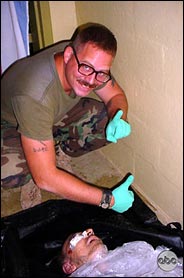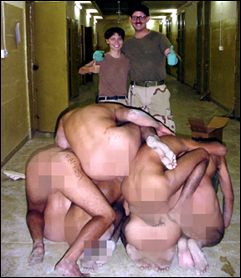Womack further explains that Graner's defense is either that the orders to Graner were lawful or that he thought they were lawful. If the jury buys either, Womack says, it must acquit Graner.
Back to why Graner may testify. If the testimony at trial shows the orders were not lawful, then Graner is left with establishing his belief in their lawfulness. His testimony seems pretty critical. It is not that unusual for a defendant to testify when relying upon an affirmative defense (other examples are self-defense and entrapment) as opposed to when the defendant is simply holding the Government to its burden of proof in establishing it was him or her that committed the crime as opposed to someone else.
Query: What will Graner's defense be if the evidence is that there were no such orders to hurt the prisoners?
On a related topic, Graner could use a public relations lesson. Or else he should stop talking to the media. These kind of comments are not going to endear him to anyone:
He seemed in a good mood after an all-male jury of four Army officers and six senior enlisted men was selected Friday to decide his fate in what is expected to be a weeklong trial. If convicted on all counts, he faces up to 17 1/2 years in a military prison.
"The sun is shining, the sky is blue and this is America," Graner said outside a Fort Hood courthouse. "Whatever happens is going to happen, but I still feel it's going to be on the positive side, and I'm going to have a smile on my face."
Human beings were tortured at Abu Ghraib, Mr. Graner. Whether you are found criminally responsible or not, you participated in their torture. You need to wipe that smile off your face.





